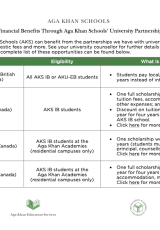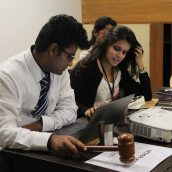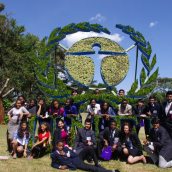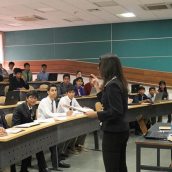Debating global issues
Model United Nations at Aga Khan Academy Hyderabad – early beginnings
When Alisha Sonawalla began studying at the Aga Khan Academy (AKA) Hyderabad in 2012, there was no Model United Nations (MUN) club. The school was only about two months old and extracurricular activity options were still being formulated. Alisha teamed up with the few lone students who also had a passion for MUN, and together they began the lengthy process of creating the club on campus.
It would be almost a year before the club was able to gain its active campus status, but that didn’t stop Alisha and her peers from spreading the MUN knowledge around. They took 25 students to the local Oakridge conference, letting the excited delegates experience firsthand what this so-called magic of Model United Nations (UN) was all about.
“I remember on the way back, we had a pen and paper, and we were trying to chalk out the plan for our own Model UN,” says Alisha.
She laughs as she reminisces, but Model United Nations is serious business for those who participate in it at the Academies, and the act of drafting a club logistical resolution is indicative of how very dedicated MUNers are to their each and every cause. Model UN is a chance for students to hone their knowledge about the world, to debate world issues and to practice public speaking. It is a chance for them to learn in an environment separate from the classroom and to collaborate on solutions to real-world problems. Above all, it is something students at the Academies take on and something that takes a hold on them even after they’ve graduated.
MUN at AKA Mombasa“The idea was to create a programme that was desirable and competitive and ultimately interesting, giving students skills that they otherwise perhaps didn’t have – general frameworks from which to analyse international relations or various events taking place globally. Giving them the chance to work on their public speaking and being able to present and articulate their thoughts in an oral manner, and then helping them to write resolutions and knowing how to present things in a formal fashion, such as you would at the United Nations itself,” explains Naheed Bardai, Acting Senior School Principal at the Aga Khan Academy Mombasa, who currently runs the school’s Model UN club with Joanne Gogelescu.
Like at AKA Hyderabad, Model UN at AKA Mombasa had humble beginnings, but now, says Naheed, it’s “oversubscribed.” The club has expanded it’s opportunities, including participation of students in the large East African Model United Nations conference, as well as creating an internal conference, a middle school MUN and organising a trip to Geneva.
Between the middle school MUN and the East African MUN, the Academy in Mombasa had a total of 90 students participating in Model UN this year.
“It was great – really high level debating on lots of global issues from ISIL in Syria and Iraq to Ukraine and deforestation and issues dealing with health,” says Naheed. “There were lots of global, pertinent and timely issues that they got a chance to dig their teeth into.”
Model UN beyond the AcademiesAcademy graduates often carry their involvement with Model UN through graduation to university life.
Amsal Lakhani is a graduate of AKA Mombasa and was intensely involved with Model UN at the Academy. He now attends Columbia University in New York, where he has continued to explore Model UN. Although he isn’t as involved in the activity as he was at the Academy, he says he isn’t ready to completely lose the connection yet. He has staffed a high school Columbia MUN conference and plans to try to staff another one in Istanbul.
Alisha Sonawalla remains devoted to Model UN. Most recently, she was the Secretary-General of AKAH MUN – AKA Hyderabad’s Model UN conference. She is also working on an initiative called iMUN, which gives kids from less fortunate backgrounds exposure to Model UN. She’s currently involved in organising the first-ever MUN in Afghanistan.
As Alisha reflects on how far the club has come and on the completion of a successful AKAH MUN conference, she has only good things to say.
“When I hear today how after the MUN seventh grade students returned to their rooms, formed their own committees, elected their own secretary-general, came up with their own crisis and still use parliamentary language in daily conversation, I know that the Model UN tradition, started in 2013, will continue for years to come. When I hear students asking about the next conference they can attend, I know that a spark has been ignited. When I hear that people are vying for the posts on the secretariat next year, I know a culture has been sowed. As we pass the baton on we have realised the power of Model UN conference.”
Read more about the recent MUN conference in Hyderabad and some personal reflections from students: AKA Hyderabad Model United Nations conference.
To watch the video prepared for the MUN conference in Hyderabad, click here.
By Farah Mohamed
Newsletter readers please click here to return to the newsletter (browser version)
publications







